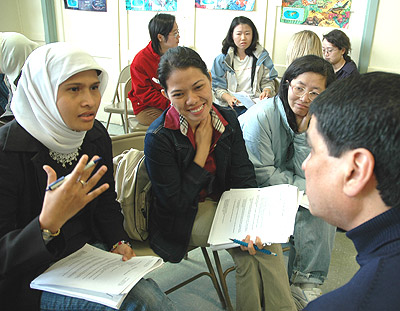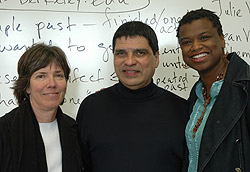Berkeleyan
 |
America 101 students living at University Village compare notes on culture shock, with Sam Castaņeda (front), director of the Visiting Scholar and Postdoc Affairs program, listening in. (Cathy Cockrell photos) |
Strangers in a strange land master the phone and the air kiss
A collaboratively developed class on U.S. habits and practices is designed to help foreign-born scholars, their family members, and campus service workers accommodate themselves to America
![]()
| 05 April 2006
Buffalo wings don't come from buffalos. It's impolite to ask a new acquaintance how much money she makes. And "I'll walk you to the station" means I don't want to bring my car, while "I'll walk you to the station" means I'm not willing to bring you back.
All this is patently obvious to U.S.-born native English speakers. But to grok how such "simple" matters read to the uninitiated, visit the campus's global village near the intersection of Marin and San Pablo avenues. There, at a community center appropriately named "Crossroads," visiting scholars and postdocs from six continents, their sometimes-stunned spouses, and immigrant custodial workers are being schooled in the exotic peculiarities of U.S. culture and American English.
Titled America 101: Life in the U.S.A., the new class is a collaboration among three campus entities - University Village's Family Housing program, the Visiting Scholar and Postdoc Affairs (VSPA) program in the Office of the Vice Chancellor for Research, and Human Resource's CALS Project - that share an interest in helping campus newcomers acclimate culturally. The numbers explain the need: Among campus service workers, 70 percent speak English as a second language. Of Berkeley's 2,200 postdocs and visiting scholars, 60 percent come from other countries; many of them live with their families at University Village, population 2,500, side-by-side with neighbors from more than 60 nations.
As residents and staff at University Village can attest, life in a mini-United Nations provides fodder for exciting cultural exchanges, but also for misunderstandings between residents and estrangement from the surrounding dominant culture. Periodically, stresses under the surface become painfully evident. Over the past eight years, three residents have committed suicide; the most recent, last spring, was a teenager whose family was about to return home to Korea.
That tragedy "put a fire under us," says Dawn Martin-Rugo, director of University Village's Recreational Program. "We've been talking for years about how to better serve residents with respect to cultural training."
 Collaborators Dawn Martin-Rugo, director of University Village's Recreational Program; Sam Castaņeda, director of Visiting Scholars and Postdoc Affairs; and CALS Project manager Jarralynne Agee shared work and resources to create the America 101 course now in progress. |
"The entire America 101 effort was fueled by an enthusiastic committee who were willing to share resources," Agee notes. University Village set up a concurrent program for participants' preschool-age children, with instruction to help the children make headway with their own cultural literacy. A social-work intern and CALS Project volunteers assist lower-level English speakers in the adult class.
Week one of America 101 focuses on "Meeting People in the U.S." (local customs regarding hugs, kisses, and handshakes, "personal" questions, how to decline an invitation). Later sessions cover such themes as "Food in America" (restaurant protocol, nutrition information, and gastronomic idioms from "pig out" to "grab a bite"), telephone communication (how to handle promotional calls or navigate a complex voicemail system), and career-related skills (understanding a job description and appropriate behavior in a job interview).
At last Thursday's class, teacher Bonu Ghosh led a young Indonesian mother in headscarf, a Finnish chemist, an Iranian chemical engineer, a German-born philosopher from France, and others through a language exercise - on how English speakers pronounce key words longer, stronger, and louder to communicate meaning. She then segued into a lively discussion of culture shock.
"Culture shock does not mean, when you're entering the country, there's a person standing there with a electrical gun," she said, to laughter. Instead it's a not-uncommon condition experienced, she said, by those who find themselves in an alien culture, and can include "unexplained feelings of sadness." Class participants provided other words associated with culture shock: suffering, scary, wonderful, frustrating, homesick, depressing, angry, confused, "loss of identity."
A young Filipina said it's when you "don't know where to go or what to do." The feeling was clearly personal. "Why are you crying?" she recalled a University Village neighbor asking her.
For Gerard, "things very simple at home" in France - like finding a good loaf of bread at a neighborhood boulangerie - "are complicated here."
The new program is designed to serve as an antidote to such feelings. America 101 sessions, which include small-group discussions facilitated by campus staffers and community volunteers, end just in time for a lively group lunch.
"They all drag in their kids," Castaņeda says. "It's really loud and exciting."
* * *
Members of the campus community interested in volunteering in America 101 and/or other cultural events are invited to visit
calsproject.berkeley.edu/volunteer for details or to e-mail calsproj@berkeley.edu.

